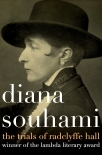The Trials of Radclyffe Hall by Diana Souhami (surface ebook reader .TXT) 📗

- Author: Diana Souhami
Book online «The Trials of Radclyffe Hall by Diana Souhami (surface ebook reader .TXT) 📗». Author Diana Souhami
Mrs Visetti had this story read to her. She visited the White Cottage, wanting help with doctors’ bills. Miss Thompson, Oxford educated, handsome and severe, shocks her conventional parents with her feminist views. She calls mother ‘little mumsy’, smokes papa’s cigarettes and reads German philosophy in their chintzy rooms. They urge her to marry William Dryden, who earns £10,000 a year. Miss Thompson finds him repulsive. He has fat hands splotched with yellow freckles and is diffident and bald (differdint and balled). At her suffrage meeting ‘all eyes are fixed on her’. She aspires to emancipate the human race. The narrator knows ‘she is going to lead the movement into a calldrern of seething sex hatred and risentment which will submurge it altogether.’
Ladye edited the stories, had them typed and John sent them off to literary magazines. ‘They always came back in my own stamped envelope – I grew to dread my own handwriting’, John wrote. These rejections increased her frustration at being marooned in Malvern without diversion. Ladye knew the publisher William Heinemann and asked him to help. They lunched with him on 1 June 1915 at 32 Lower Belgrave Street. John was too shy to talk or even eat: ‘But he seemed quite willing to do all the talking and I heard such words of praise that I could scarcely believe my ears.’ He commended her narrative skill and original tone and advised her to write a full-length novel. His encouragement gave her focus, though he died in 1920 and it took her a decade to get a novel into print.
She began an autobiography, Michael West, a roman-à-clef. She changed her own gender, or in her view revealed her true gender, and changed the names of family and lovers, but it was her life, from birth on, that she described and explained. Michael West was the unloved, abused, dyslexic, romantic boy she supposed herself to be. The book was an indictment of her mother and an exercise in self-examination. She took it to the point of meeting Ladye in Homburg, then it petered out unfinished. Ladye complained at the long hours she worked at it and feared she would make herself ill.
Ladye interspersed her diary entries about her aches and pains and John’s literary progress with details of the war: Kitchener’s appeals for armaments, the deaths of the sons of friends, the Lusitania torpedoed off the Irish coast with 1,350 passengers dead. Believing John to be gifted and knowing her to be vulnerable, she tolerated her moods. But she suffered their rows. John’s affection for her was not revived by separation from Phoebe Hoare. Ladye was ‘too upset to go out’ on 20 March 1915 after an argument about the rambling style of her will. She got the cook and the gardener to witness the document and could not sleep at night.
The war put a stop to shopping treats and sunshine holidays. Both missed metropolitan life. Ladye tried to make light of how seedy she felt, her high blood pressure, angina attacks, wounds, abscesses in her gums and aching teeth – in spring she had seven out under gas. Her ill-health consumed John with anxiety, but made her tetchy too.
On 8 June they motored to Oxford for the court hearing against Mrs Lakin. At the Randolph Hotel John prepared papers until midnight with the solicitor, Theodore Goddard. Next day they hung about the courts, their case delayed by a murder trial. Chance events now gave her ideas for fiction. She began a parable about prejudice called ‘Woman in a Crêpe Bonnet’. A man is condemned to death for killing his pregnant girlfriend. A woman waits outside the court wanting a prurient glimpse of the murderer, wanting him to hang. The doors open, he emerges handcuffed, he is her estranged son.
Cross-examined by Mrs Lakin’s counsel, John gave clear replies and a consistent version of events. She refuted, with reference to witnesses and photographs, accusations that her car was going at forty-five miles an hour on the wrong side of the road, that it was out of control because of the quantities of luggage on its roof and that she had been abusive to Mrs Lakin. The jury found in her favour and Ladye was awarded unspecified damages. She ‘nearly fainted’ with relief. With John, she gave thanks in a Jesuit church, went to the cinema, then home and early to bed. For John the courtroom process went beyond the specific case. She sought justice in a quintessential sense. Right, honour and truth must be declared to be on her side. She settled the amount of damages through solicitors, then fired Serpell the chauffeur.
London became safer and she and Ladye reclaimed the flat in Cadogan Square. They shopped at Selfridges, dined at the deserted Carlton Grill, saw an exhibition of war paintings at the Royal Academy and played poker with Ernest Thesiger. Dolly Clarke, back at Swan Walk, was pregnant with her second child. John viewed her, like Mrs Visetti, as a dependant. She feared that the allowance she gave her would prove inadequate, but felt she could not afford more.
At heart John wanted more than this life of teas and trips. Toupie Lowther managed an all-women ambulance unit in France. With the Red Cross she drove wounded soldiers to safety from within 350 yards of German guns. Excitement, fame and romance were elsewhere. John’s stories were returned with standard rejection slips – ‘the editor regrets …’ – her poems were little volumes on library shelves; she was thirty-five; the affair with Phoebe Hoare was over.
1 August 1915 came to feature as an anniversary. The day was sunny. She and Ladye went to midday mass





Comments (0)